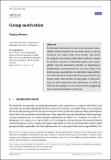Files in this item
Group motivation
Item metadata
| dc.contributor.author | Brown, Jessica | |
| dc.date.accessioned | 2021-05-04T16:30:02Z | |
| dc.date.available | 2021-05-04T16:30:02Z | |
| dc.date.issued | 2022-05-23 | |
| dc.identifier | 273469459 | |
| dc.identifier | 42863fd4-f5d8-47bd-8291-90bec8502684 | |
| dc.identifier | 000646286800001 | |
| dc.identifier | 85105055460 | |
| dc.identifier.citation | Brown , J 2022 , ' Group motivation ' , Noûs , vol. 56 , no. 2 , 12366 , pp. 494-510 . https://doi.org/10.1111/nous.12366 | en |
| dc.identifier.issn | 0029-4624 | |
| dc.identifier.other | ORCID: /0000-0002-1149-4814/work/93515203 | |
| dc.identifier.uri | https://hdl.handle.net/10023/23113 | |
| dc.description | This is part of a project on group responsibility funded by the Leverhulme Trust. | en |
| dc.description.abstract | In this paper I discuss a key issue for group moral responsibility, namely whether we can make sense of a group acting for one reason rather than another. The notion of acting for one reason rather than another is central to standard accounts of individual agency and responsibility; and also determines whether an individual is blameworthy or praiseworthy for an action. Thus if we model group responsibility on individual responsibility, we need to be able to make sense of a group acting for one reason rather than another. In this paper, I raise problems for both summative and inflationary accounts of what it is for a group to act on a reason, before suggesting several potential solutions at the end. | |
| dc.format.extent | 17 | |
| dc.format.extent | 149021 | |
| dc.language.iso | eng | |
| dc.relation.ispartof | Noûs | en |
| dc.subject | BF Psychology | en |
| dc.subject | BJ Ethics | en |
| dc.subject | T-NDAS | en |
| dc.subject.lcc | BF | en |
| dc.subject.lcc | BJ | en |
| dc.title | Group motivation | en |
| dc.type | Journal article | en |
| dc.contributor.sponsor | The Leverhulme Trust | en |
| dc.contributor.institution | University of St Andrews. Philosophy | en |
| dc.identifier.doi | 10.1111/nous.12366 | |
| dc.description.status | Peer reviewed | en |
| dc.identifier.grantnumber | en |
This item appears in the following Collection(s)
Items in the St Andrews Research Repository are protected by copyright, with all rights reserved, unless otherwise indicated.

